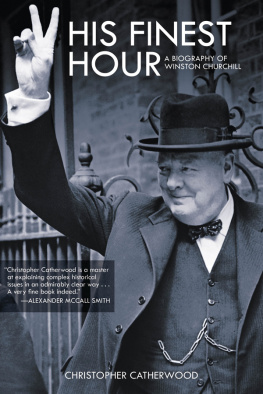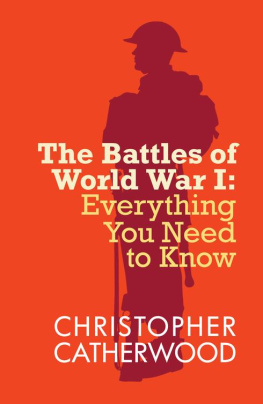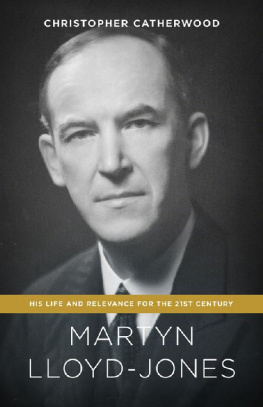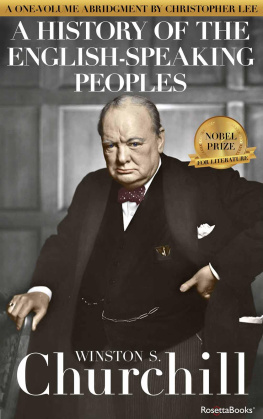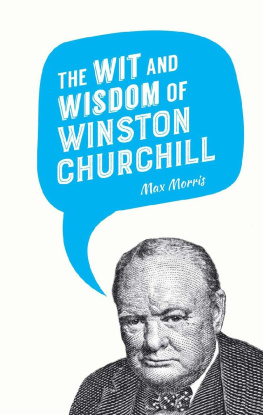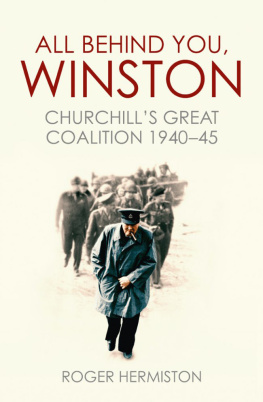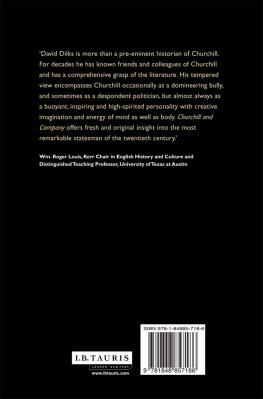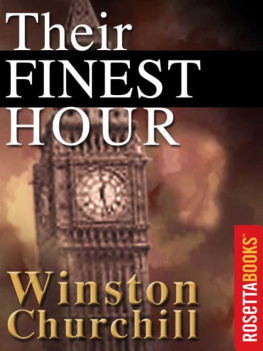Christopher Catherwood worked as consultant to the Blair cabinets Strategy Unit, in the Admiralty building where Churchill was based (193940) as First Lord of the Admiralty. He teaches history part-time at the universities of Cambridge and Richmond (Virginia), where he is annual Writer in Residence. His books include Winstons Folly , Why the Nations Rage: Killing in the Name of God , Britains Balkan Dilemma in World War II and Christians, Muslims and Islamic Rage.
Also by Christopher Catherwood
Winston Churchill: The Flawed Genius of WWII (2009)
Five Leading Reformers: Lives at a Watershed of History (2008)
Making War in the Name of God (2007)
A Brief History of the Middle East (2006)
Winstons Folly (2004) (published in the United States as Churchills Folly: How Winston Churchill created Modern Iraq )
Christians, Muslims and Islamic Rage: What is going on and why it happened (2003)
Britains Balkan Dilemma in World War II: Britains Balkan Dilemma 193941 (2003)
Why the Nations Rage: Killing in the Name of God (2002)
Copyright Christopher Catherwood, 2010
All Rights Reserved. No part of this book may be reproduced in any manner without the express written consent of the publisher, except in the case of brief excerpts in critical reviews or articles. All inquiries should be addressed to Skyhorse Publishing, 555 Eighth Avenue, Suite 903, New York, NY 10018.
Skyhorse Publishing books may be purchased in bulk at special discounts for sales promotion, corporate gifts, fund-raising, or educational purposes. Special editions can also be created to specifications. For details, contact the Special Sales Department, Skyhorse Publishing, 555 Eighth Avenue, Suite 903, New York, NY 10018 or .
www.skyhorsepublishing.com
10 9 8 7 6 5 4 3 2 1
Library of Congress Cataloging-in-Publication Data available on file
Typeset by TW Typesetting, Plymouth, Devon
Printed in the EU
To the Archives Staff
of
the Churchill Archives Centre
of
Churchill College Cambridge
who have helped countless historians over many years
with such friendship, enthusiasm and expertise
and who have done so much to make this book
and many of my other works
not just possible but such a pleasure to write.
AND
To my very favourite former Archivist
(from another collection, in the United States),
whom having met a mutual friend in those archives years
ago led him and his wife to introduce me to my wife,
Paulette with whom I have enjoyed the happiness that
Winston enjoyed with his Clementine.
CONTENTS
ACKNOWLEDGEMENTS
How many acknowledgements have we read that end with something like, And finally I give warmest thanks to Ermintrude, who was so kind during the writing of this book
This is the biography of a happily married man. (Well, he certainly was and apart from one possible wobble in the 1930s, one can say that Clementine was too, even though Churchill must have been an extraordinarily difficult man with whom to live, as we shall see.)
Thankfully, I am also singularly blessed in being married to a truly wonderful woman, my wife Paulette, and so perhaps it is fitting in a biography such as this to start the acknowledgements with her, rather than dismissing her in a few words at the end. Although I had written books before marriage to her, my real writing career coincides with marrying Paulette, and without her steadfast love, encouragement, wisdom, counsel, support and much else besides, none of the books I have written these past many years since our wedding date might ever have seen the light of day, this one fully included. So to Paulette: profounder thanks than words can ever say.
Thank you too to that publisher par excellence Nick Robinson, for whose Constable & Robinson imprint this is my third book. In days when so many of the older publishers have been absorbed into vast, anonymous international conglomerates as I was writing this book I read the sad story of a centuries-old publisher whose authors began with Byron and Jane Austen, via Charles Darwin down to John Betjeman, that is now part of such a conglomerate Constable & Robinson has managed to stay independent and keep publishing the way it used to be. Four cheers for such people, and warmest gratitude too to so many of the Constable staff, starting with my editor Leo Hollis, who kindly commissioned this book, and who is a distinguished author in his own right. His editing of the book has been a delight. Thanks, too, to Jaqueline Mitchell for her conscientious copyediting. Next we have the much appreciated and widely revered former sales director Andrew Hayward, and last but not least, the splendid East Anglia sales representative Phil Robey, who has sold so many copies of my previous books into numerous bookshops around the country, and his wife Catherine, who maintains the business.
Historians around the world have been grateful beyond measure to the staff of the Archives Centre at Churchill College here in Cambridge. Often they are unsung, which is why some of us, including Nigel Knight, have taken to thanking all of them, from the Director, Allen Packwood (of whom it is said if you spell his first name right you must be one of the cognoscenti ) downwards. For this book, since it is on Winston Churchill, I thought I would take it a step further and dedicate the book to them. All of them deserve it they do a magnificent and sadly often unrecognized job, to the highest standards. They are, each one, a role model to archivists around the world on how such places should be run.
Allen Packwood, the Director, does a splendid job not just in helping historians like me which he does superbly but also in putting the Archives on the international map, especially in the United States, where his contacts and range of friends and supporters are prodigious, something which has done not only immense good for the Churchill Archives but also for the cause of historical research in general. Historians everywhere are grateful to Allen and I am happy to be among them.
I am equally grateful to his colleagues Andrew Riley (famous on television and beyond as the expert on the Thatcher archives, which are also in Churchill College), Natalie Adams, Katherine Thompson, Madelin Terrazas, and Sophie Bridges whom I have been glad to get to know along with her equally delightful partner, Patrick, and who is the authority on the papers of Quintin Hogg, winner of the famous 1938 Oxford by-election.
The assistants, the main interface with the general public, have been excellent in helping with arcane technical matters such as how to use a spool, as well as fetching interminable amounts of the archive for me: Dr Lynsey Robertson (a distinguished medievalist in her own right) and, especially, Caroline Herbert, who manages a full-time job helping historians as well as being (along with her astronomer husband Peter) active in one of Cambridges exciting new church developments. Thank you too to former staff members Claire Knight and Sandra Marsh. The conservator, Sarah Lewery the lady in the white coat has done a wonderful job of keeping the archives in a state in which they can still be seen, ably helped by her assistant Bridget Warrington and, last but not least, Julie Sanderson.
The archivists all live up to their reputation of being highly knowledgeable and equally personable: the administrator, legendary in the academic sphere, has excelled in keeping absent-minded historians and archivists connected to the real world. Many of the staff also eat at the College the dining hall, in memory of Winston Churchill, is the biggest in Cambridge and they have been the very best of lunchtime companions. The staff of the Archives Centre have become friends as well as colleagues, and I have been blessed in having such a delightful crew of people with whom to work during the research and writing of this book.
Next page
